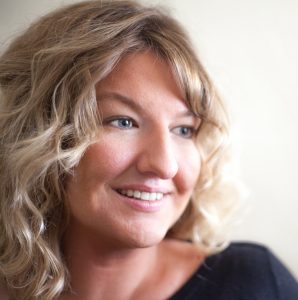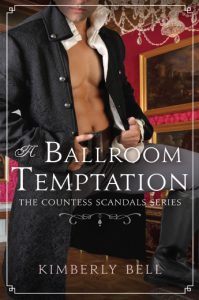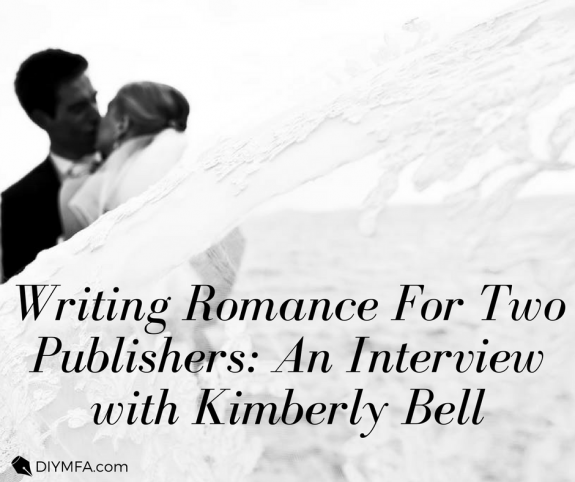Kimberly Bell is a historical romance author, and she’s here to share her secrets about getting two book contracts and writing five books in two years. Her first two books were published by Penguin Intermix last year, with her third book releasing next week on April 18th. Her second romance series will begin releasing through Entangled Publishing in July.
Robin Lovett: Welcome to DIY MFA! Let’s start with why, of all the genres, you chose to write romance.

Kimberly Bell: There were a lot of reasons I started writing a romance novel in the beginning. From a business standpoint, romance is 80% of the fiction book market, both globally and in North America, and the average romance reader spends over $100 in books each month. That’s a huge demand, which theoretically increased the odds of my book selling.
Then, there’s the fact that I love the genre. I started reading historical romances when I was ten. It’s the reason I have a kickass vocabulary, a whole slew of random historical facts trapped in my brain, and a not-entirely-secret desire to marry Prince Harry someday.
The biggest reason, though, was the community. As readers and fellow writers go, it is hands down the kindest, most nurturing group of people you will ever find in business. Maybe it’s because romance is a heavily female industry, on all sides of book creation and consumption—or maybe it’s just uniquely awesome—but having your competitors root for you is priceless in this solitary profession.
Lovett: Once you decided to write romance, what process did you use to write your first book? How long did it take and how did you motivate yourself to finish?
Bell: My first book took me a year. I had never written long form or fiction before, so I was learning both of those things while learning my story. It was a 100% pants’d affair. I joined a few online writing communities to get feedback, and just kept trying to put down words whenever I could. I didn’t set myself a deadline until the book was more than half done. By then, I had learned a ton and my 30th birthday was coming up. My brain latched on to the idea of finishing the book before I turned 30, and I did.
Lovett: An age milestone! What an excellent motivator! After you finished and edited your first book, what made you decide to pursue traditional publishing? What were your steps to getting a book contract?
Bell: This answer is going to run so long! I never considered self-publishing for my first books, because I didn’t know anything about the publishing industry and I wanted to learn from people who’d been doing it for a while. I queried the first five agents on my wish list (tip: Don’t start with your favorites. If your query needs improvement, you’ll have burned the top of your list before you figure it out). Every time I got a rejection, I sent to a new agent to keep my outstanding queries at five. I definitely recommend that strategy, because it takes what can be a demoralizing moment and slathers it in new hopefulness.
When I’d gotten nine rejections (which is not many but I have zero patience) with no requests for fulls or partials, I decided to rework my query. The first send of the new query (off a request from a #pitmad tweet) landed me my agent.
From there, we worked together on a submission strategy—and I do mean strategy. Publishing moves very slow, until it doesn’t. If you and your agent can work together to have legitimate reasons to update an editor (like final-ing in a contest) that aren’t just an impatient nudge, it can help save your sanity. To give you an idea of my timeline, which means nothing because everyone’s is different, I went on submission in late September. Historical was considered a hard sell/declining subgenre at the time, and we were targeting Big 5 houses and the largest romance only publishers. In late April, we got our first offer on the book and a second a week later.
Lovett: I suppose I should add, we both have the same agent and that’s how we met. Shout out to Rachel Brooks at the L. Perkins Agency! Especially since I found her through #PitMad too. Shortly after announcing your three book contract with Penguin, you announced an additional two book contract with Entangled. Do you account this to pure luck, or was there an extra special ingredient in your writing you attribute to your fast success?
Bell: I don’t know that I’d call it luck, so much as the incredible team at Entangled. They’d read my first book and, after bumping into my agent at a conference, got into a discussion about having me pitch some new ideas. I was super nervous about running two contracts at once (completely justified, as it turns out) but even with the full advantage of hindsight, I wouldn’t go back and change it. Entangled has been such an amazing home for my books.
I will say there is a lot more than just deadline pressure to take into account, especially when you’ve only ever written one book and you’re suddenly on the hook for five. I chose to knowingly prioritize my career trajectory over my sanity, but it’s super important to know exactly what you value before you go on submission. Opportunities can come out of the woodwork. If you’re not clear on your goals, you might end up making a decision that you regret because you didn’t have enough time to truly think it out. Despite the crazy long wait to hear anything at all, once you get an offer the deadline for your response is usually super quick.
Lovett: Given your experiences and what you’ve learned, do you have any words of encouragement or caution for us?
Bell: There’s a phrase I heard a lot around writing groups when I was writing my first book. “If you don’t absolutely love writing, you should do something else.” I think that’s complete crap. The reality of publishing is—it’s hard. It’s a lot of hard work and hard decisions. The harshness of publishing—especially once you’ve “made it” and gotten a book deal—can chew up and spit out creative personalities. The better phrase to approach your publishing journey from is “Expect the worst, hope for the best.”
There are things to love about this journey. Things that will make you dance giddy around your living room for hours. But never forget that it’s work. A lot of days are going to suck and make you want to quit and do something easier. If you can keep your head up through those days, there is a pants-optional life waiting for you.
Lovett: Thank you so much for your candid answers! Before we go, anything you’d like to share with us about your new book coming out next week?

Bell: Umm…that you guys should read it? 😀 The book coming out on April 18th, A Ballroom Temptation, is my third book to publish and the fourth book I wrote (my print books take a lot longer to hit the market). It’s honestly my favorite so far, because it combines a lot of the things I’ve been learning along the way about stakes and emotion, which were not my strong suit when I started. It’s also the culmination of my plan to write relationships that aren’t quite the usual template, but feel super real to me.
Kimberly Bell can be found on Twitter @bellromance or on her website www.bellromance.com. She is the co-founder of #RWchat, a weekly Twitter chat for romance writers.

Robin Lovett writes contemporary romance, and her next series of dark romances will release summer 2017, beginning with STRANGER. She loves to chat on Twitter @LovettRomance and every Sunday evening you can find her chatting with other romance writers at #RWChat. She is represented by Rachel Brooks of the L. Perkins Agency.







